#[sort of debating on doing a shipping call for enji]
Text

#geek speak 🔥 mun post#[sort of debating on doing a shipping call for enji]#[but idk as this still isn't something i'm sure some people want]#[like i'm still hecking surprised by my ship with bones since my muse is also surprised by it]#[basically i'm interested in shipping ; like literally any sort of shipping ; but i'm a shy panda]#[and still don't know how people feel about enji]
8 notes
·
View notes
Text
What Does It Mean to Save?
I keep seeing it said that Deku, Ochaco, and Shouto will “save” Shigaraki, Himiko, and Dabi, but that there will be no redemption and/or no survival for them. I’m truly not trying to vague these posts and everyone is entitled to their opinion, but literary criticism is fundamentally responsive so I’m writing this anyways.
I personally think that’s not BNHA’s definition of saving nor of redemption. So here, have a deep dive into literary tropes related to redemption, genre, and character arcs as they pertain to BNHA and the question of: what does it mean to save Shigaraki, Touya, and Himiko?
Before we begin, let me say that while we might be personally uncomfortable with redemption (there’s a redemption arc in BNHA I am personally quite uncomfortable with), that doesn’t inherently mean the narrative won’t go there. The key principle I’m operating on here is BNHA’s message that heroes save people. It’s held up as the highest ideal.

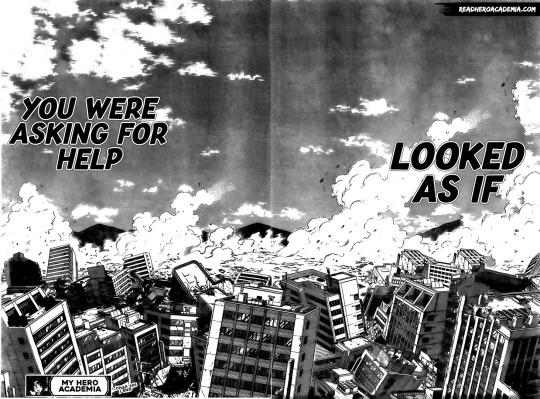
So let’s talk redemption in BNHA-verse. With this guy, whose redemption arc I dislike in principle but accept as part of the story so don’t come for me stans and/or antis. I’m analyzing because it shows us what redemption means in BNHA-verse, whether or not that is satisfying to you personally as it fits/does not fit with your own morality/philosophy.
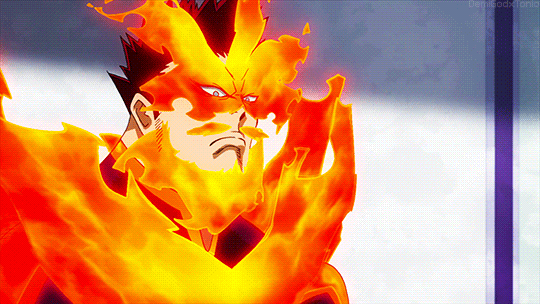
If Endeavor can be redeemed and live, and he’s Bakugou’s negative foil, I highly doubt Shigaraki and Deku as well as Touya and Shouto and Ochaco and Himiko will be any different. Why? Because Enji is an adult character. The others--well, Himiko’s age we don’t know, but we do know that Shigaraki and Dabi are technically adults. But does the story consider them adults?
(It doesn’t.)
Child-coded characters are generally more likely to survive a redemption, which I’ll explain more later. First I have to define what I mean by child-coding, because I DO NOT mean this in the way it’s often (mis)used in fandom wank. Child-coding is a real thing, but it is not done to infantilize and it has nothing to do with shipping.
Child coding frames the character as a child for a few narrative purposes to convey a story’s theme or purpose. For example, if it’s a coming of age story coding a character as a child even if they legally are not emphasizes their journey to an understanding of self-actualization, or a true understanding of self with self-awareness and an understanding of self-value. An example of an adult coded as a child is The Kite Runner, wherein Amir is a legal adult for half the story, even married for fifteen years so we’re talking 30s-40s, but he does not truly become an adult until he returns to his homeland and takes responsibility for a childhood sin. In Attack on Titan, the main characters are now nineteen, but are still struggling to take responsibility as adults and have only started doing so now that their mentors/parental figures have started dying.
Along those lines, in any kind of story, you can code a character as a child of someone, regardless of biological relationship, to convey the type of relationship they have (usually a mentor one). For an example of this, see Bungo Stray Dogs’ Dazai and Akutagawa. Despite their two year age difference, Dazai recruited him to the mafia, abandoned him, and Akutagawa desperately seeks his approval. Usually in these stories a character will “overcome” their parental figure. This can be done through overcoming their need for the parental figure’s approval in stories where the parental figure is kindly (such as in Harry Potter, when in the final book Harry, Ron, and Hermione leave the Weasleys to find the Horcruxes despite Mrs. Weasley’s please) or through like, killing/stopping/leaving the parental figure when they are abusive (see fairy tales like Rapunzel and Cinderella). The parental link to self-actualization is because it is childlike (and a part of actual psychology that is reflected in literature) to see yourself as a part of your parent; self-actualized person would see yourself as a distinct person from your parent, but also acknowledge the ways in which they’ve shaped you.
So, how do you code a character as a child? BNHA isn’t subtle about it, because Horikoshi seldom is subtle about anything. The villain trio are all coded as children.
Shigaraki Tomura:


Who cannot achieve self-actualization so long as AFO has access to his body, as he’s literally trying to possess him. He’s trying, but it’s not gonna work because Shigaraki can’t keep AFO and become an adult at the same time. It’s a choice the narrative is setting up: your dream of destroying, or your freedom? (To get the latter, he’ll probably have to destroy AFO).
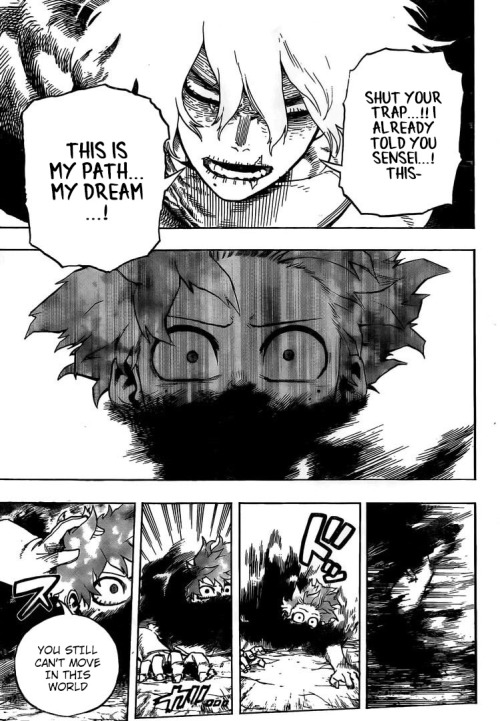
Todoroki Touya, who is repeatedly emphasized as a small child when compared to his siblings, and yes, I know he’s now tall. Specifically he’s spotlighted as the child of Endeavor:
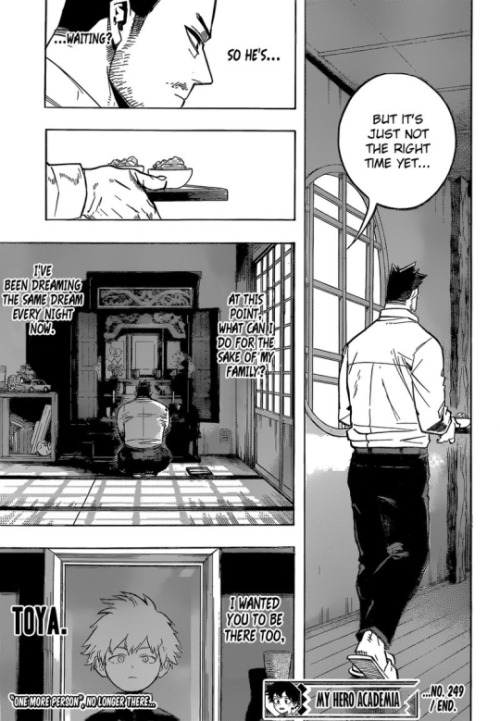

And he’s the least self-actualized one in a lot of ways, contradicting himself constantly. I’m not Endeavor, DUH! But these are Endeavor’s flames! He’s gonna have to choose one or the other, because the tragic irony is that the more he takes out his rage on those around him, the more like Endeavor he becomes.
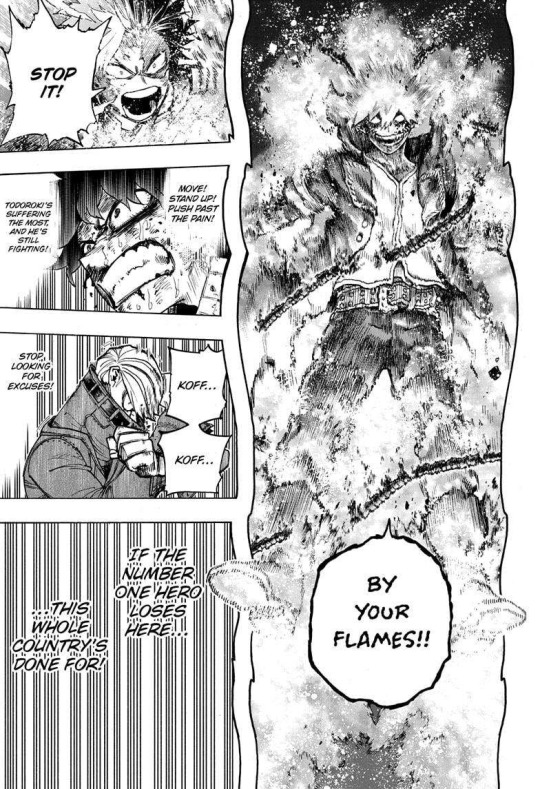

And Toga Himiko (who might well literally be a legal child), who is actually the most self-actualized one thus far, because she rejects Curious’s child insistence (Curious holds her in a Pieta pose, based on Michelangelo’s statue wherein Mary holds a deceased Christ):

She’s still got, like, a way to go though:

Because Himiko also wants to be like the people she loves to the point where she loses her own identity in them, which is er, not self-actualization. So she’ll have to choose whether or not she really wants to be like the people she loves or whether she wants to live her own way, which she herself tells us how that would end (death):

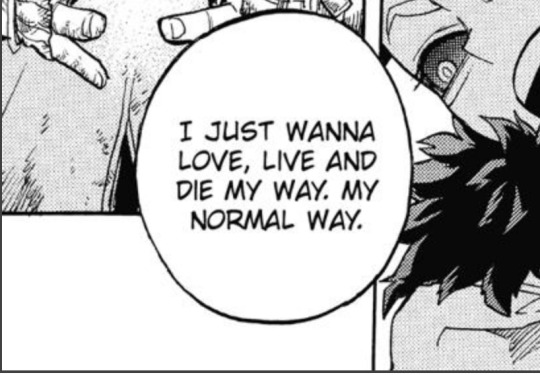
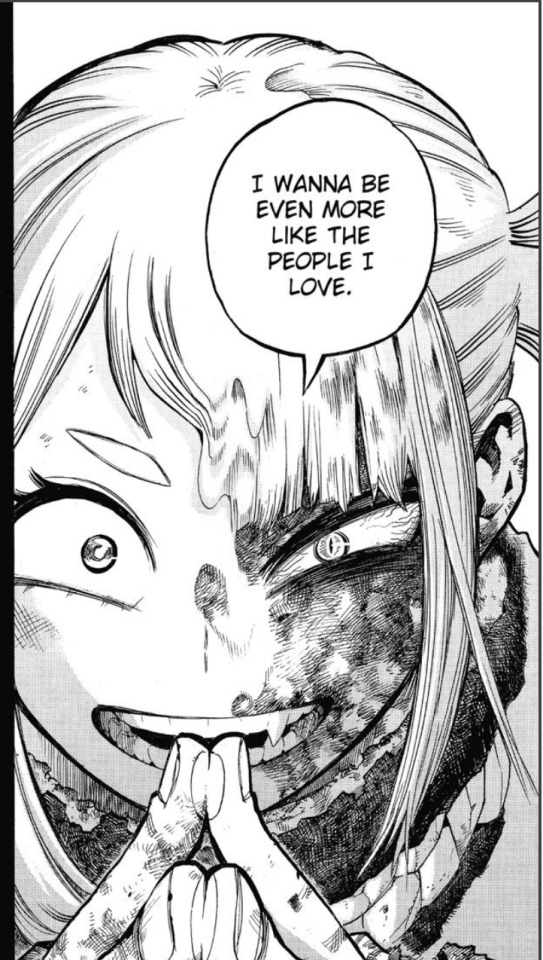
Deku said it himself: it’s good to focus on what someone is doing now. And look, I have issues with this statement and how it’s framed. I’ve talked about it at length and it was doomed to fail because Shouto himself told us long ago that it was annoying to hear a righteous speech by a stranger when you hadn’t gone through the same, plus Endeavor kinda failed by choosing being a hero over a dad here. But, the principle is that if the past doesn’t preclude Endeavor from seeking a better self, why would it preclude three characters coded as children, one of whom is literally somewhat the product of Endeavor’s sins? BNHA doesn’t think the past keeps someone from a better future.
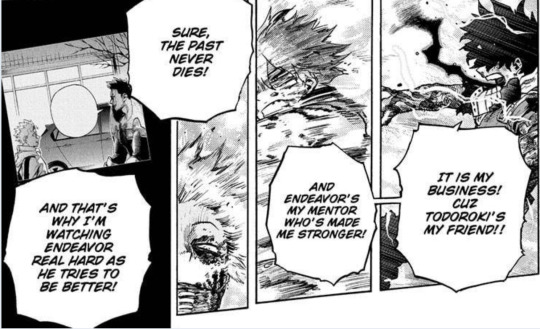
So what about Dabi’s counterpoint, which is indeed valid? Well, redemption doesn’t mean the past forgets, either. It’s complicated and nuanced, and we can debate how well Horikoshi strikes this nuance (it’s got its flaws), and admittedly I don’t know how this will go down in the future. But it is asking Endeavor: how do you redeem yourself to the people you’ve hurt? And we have Endeavor asking this question to Touya’s shrine. I mean, the foreshadowing is obvious. Endeavor has to redeem himself by trying to save Touya. However, it will still probably come down to Shouto to save Touya.

For our three villains, it’s a little harder to predict... well, sort of. For Shigaraki it’s extremely obvious: he has to help take down AFO. Dabi probably has to do something to help his family (siblings probably), but it’s vague. Toga needs help and not condemnation, but presumably she’ll help Ochaco with something.
So, is this redemption? I’d define it as redemption in the eyes of the narrative. To address what makes a redemption is another essay unto itself, but if we bring in the oft-compared Star Wars example: did Darth Vader get a redemption? Did Ben Solo? Everyone says yes to both. However, only Luke witnesses Vader’s redemption, and only Rey Ben Solo’s. So the rest of the galaxy? Doesn’t think so. When I say they’ll be redeemed, I’m defining it as their role in the eyes of the narrative, not whether or not society will accept them or even whether their victims will forgive them (of note, in canonical novels, Leia never forgave Darth Vader despite learning he was her father and obviously knowing Luke’s account of his redemption was true).
So, redemption in a narrative doesn’t mean all of society has to forgive and accept them. Dabi has still like, murdered 30 people--many of whom were thugs, but he himself acknowledges they didn’t deserve to die. Additionally, he himself also acknowledges that the families left behind--their feelings matter:
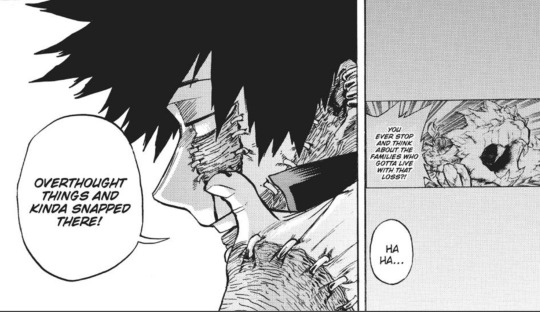
But why does that mean they have to die? Why even does it mean they have to languish in prison forever? (If there’s even a safe prison at the end of BNHA which I kinda have doubts about.) Heroes have also killed: see Hawks as Exhibit A. In fact, some people want revenge on the heroes precisely because they arrested or killed their loved ones (jail isn’t held up as a rehabilitative place in BNHA’s world. In most countries it isn’t in real life, either, but again that’s for another essay). So why don’t the League’s feelings on Twice’s death matter just as much as the feelings of unnamed and unseen (and thereby less important narratively) characters?
Additionally, regarding death... the villains routinely get called on their death wishes. Himiko’s determination to decide how/when she dies is called out because this is right before Twice overcomes his trauma to save her, and the next arc they appear in is when Twice dies trying to save her again. Dabi’s suicide wish keeps him from getting close to others, and it keeps getting thwarted. Shigaraki’s obsession with destruction and death is clearly not a good thing, and his rejection of his family’s desire for them to join him in death this past arc is growth.
In other words: what Dabi said and what Snatch said about families and how they feel matter for the villains too. The villains are their own weird found family (Dabi as the deadbeat prodigal brother of both his families). Their deaths--Magne’s and Twice’s thus far, and I’m not ruling out further deaths in the future--affect the others. People’s feelings on losing loved ones matter. The villains are people, as Himiko said herself this arc:
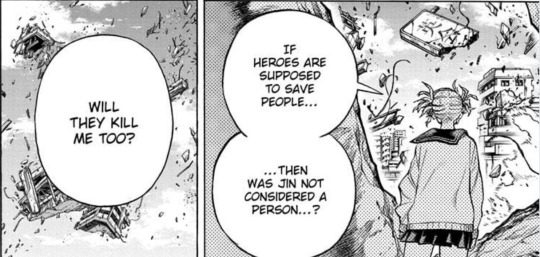
Their feelings about each other matter:
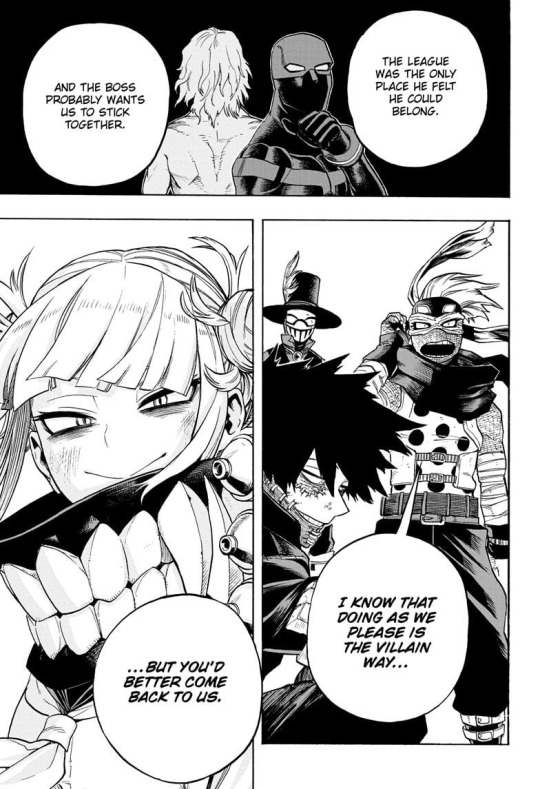
How would Touya dying affect the Todorokis? At least they saved him spiritually, I guess, but that’s absolutely lame narratively, and if you have Enji eventually do a sacrifice to save Dabi (pretty likely, even if I personally think Enji will survive said sacrifice) then what’s the point of Dabi dying? How would Himiko dying affect society? As a martyr like Curious wanted her to be, even a redeemed one? A tragic warning story? What even is the point of Ochaco saving her if that’s the case? If Shigaraki dies, well, who would mourn besides Deku? How would Shigaraki dying affect the surviving members of the league? He just couldn’t be saved physically?
It’s not impossible some of this happens, but it doesn’t seem like great writing, especially with panels like, oh, these that show us BNHA’s perspective on death:
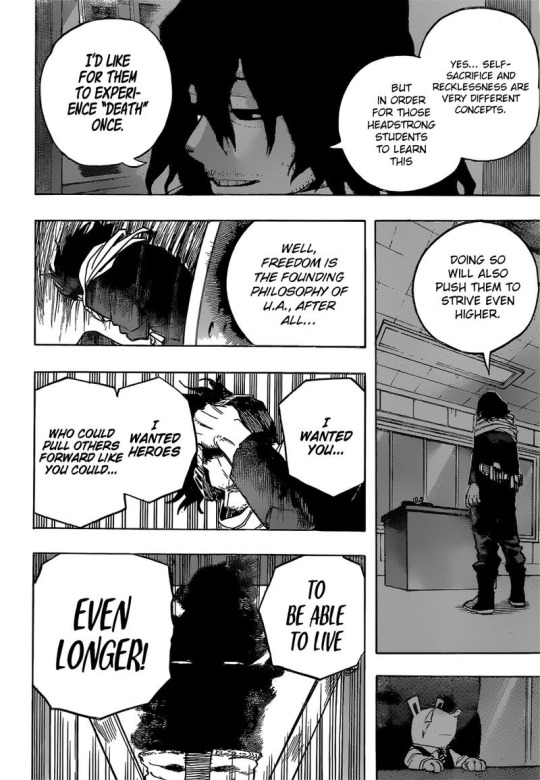
Sacrificing something is a type of death that occurs in stories; this should happen in a redemption arc, which is why I’ve been saying Enji needs to sacrifice his hero reputation to help save Touya and even then it’ll still be Shouto imo who does the saving. But physical death?

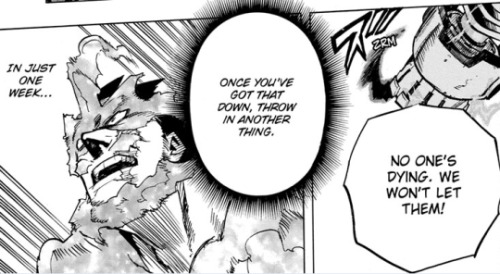
If you want further analysis of the latter two panels and how they relate to the ending, see here.
We already have another villain who will definitely die redemptively (Kurogiri--an adult coded character--because he’s already, like, dead), and Spinner and Mr. Compress aren’t coded as kids so I hold them with anxiety towards the end. But again, this isn’t me being ageist or saying this is the way things ought to be in fiction or real life: it’s me looking at writing tropes and saying that child-coded characters tend to survive their redemptions. See: Zuko. Why? Because the death of children or child-coded characters is a tragedy. When a child-coded character dies redemptively it doesn’t feel like a happy ending and if framed as such, it’s often criticized for bad writing (see: Ben Solo). Curious even called this out in her fight with Himiko. I would hope Horikoshi doesn’t end the story being like yeah Curious was right that’s the best use of Himiko’s/Dabi’s/Shigaraki’s arcs:
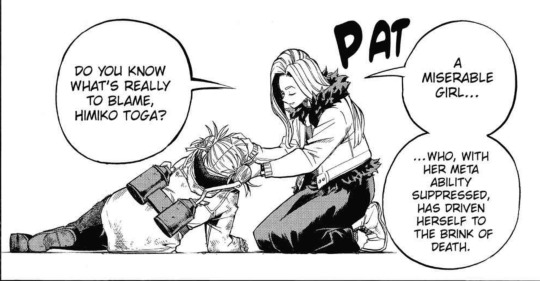

Additionally, as for the believability of a character getting a new chance after so much destruction and murder... well, it’s kinda a thing in shonen and even in seinen? For better or for worse, it’s a thing. We have Vegeta in Dragon Ball Z and Kaneki Ken in Tokyo Ghoul (Kaneki, by the way, is absolutely an inspiration for Shigaraki). We can debate how well-written these redemptions are (I personally have been quite critical of Kaneki’s despite wanting it to happen narratively), but it can be done. BNHA’s Japan especially isn’t as harsh a world as Tokyo Ghoul’s Japan, so it would make even more sense for something like Kaneki’s ending.
The reality is that the cycle of revenge via hurting people and then leaving hurting families and loved ones has to stop somewhere. Someone has to be the bigger person and step up and be like “naw.” That’s heroic. That’s brave. That’s sacrificial itself. Justice itself doesn’t really exist in its purest form without mercy.
There’s another genre-reason I don’t see death or jail as likely (I could see, like, maybe a mental health ward like Rei’s? But it’s too soon to speculate).
If saving is considered a good thing for the story, if it’s truly the highest ideal, then saving someone should be rewarded by the narrative. The characters who save should have a positive result to show us this a good thing.
This is why it doesn’t work for the heroes’ end journey to be accepting that some people cannot be saved. The notion of just accepting that you cannot do something, you cannot save everyone, you cannot, cannot, cannot, is called out as a flaw of society. Determination, on the other hand, is rewarded.
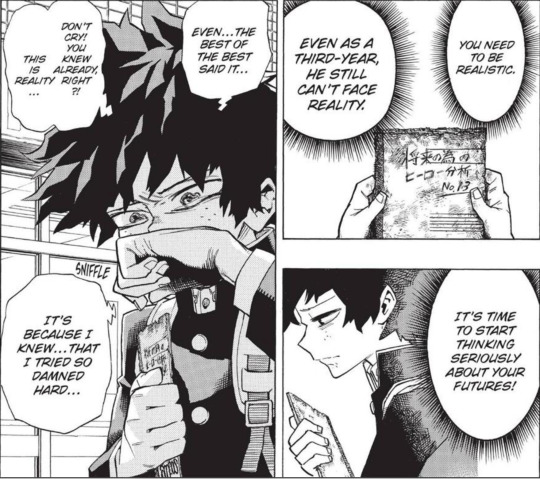
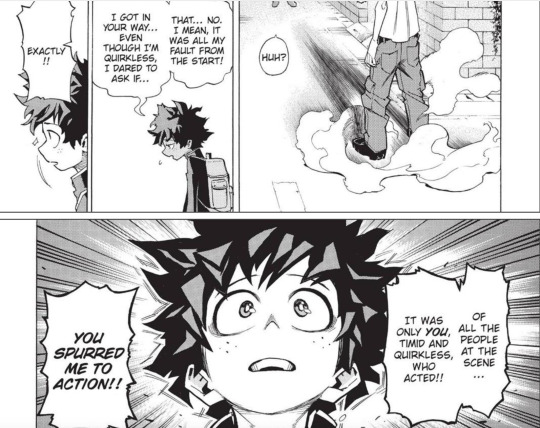
We see it with Deku as well as with Mirio.
So, what if they save them and the redeemed characters then go on to sacrifice themselves in their redemption and die (come to the same end)? If saving changes absolutely nothing for the saved person, if it’s too late for the saved from themselves to change and/or do anything that matters besides die, then the narrative theme of saving as important is left unemphasized at best and undermined at worst. Simple intrinsic knowledge that the kids “did the right thing” doesn’t cut it for a story with so much focus on physical saving when the kids are already doing the right thing; moral struggles about whether to choose to be good aren’t really Deku, Ochaco, or Shouto’s arcs. It works for Aizawa’s arc with Kurogiri, but not for the kiddos. If BNHA was more of a philosophical/spiritual text, that would indeed make sense, but it is not. Genre-wise, BNHA is a fantastical superhero optimistic story, not a gritty real-world set drama.
#bnha meta#mha meta#bnha 295#mha 295#deku#league of villains#shigaraki tomura#shimura tenko#todoroki shouto#todoroki touya#todoroki enji#endeavor#todoroki family#toga himiko#all for one#afo#uraraka ochako#bakugou katsuki#aizawa shouta#bnha theory#mha theory#my hero academia#boku no hero academia#midoriya izuku#kurogiri
637 notes
·
View notes
Text

#geek speak 🔥 mun post#[sort of wondering if i should do a shipping call post]#[on both enji and keigo]#[it wouldn't be just for romantic ships but platonic/family ones too]#[but i also sort of love just stumbling into that stuff]#[lordie idk i'm just going work on stuff and play coral island till bed]#[while debating this]
4 notes
·
View notes